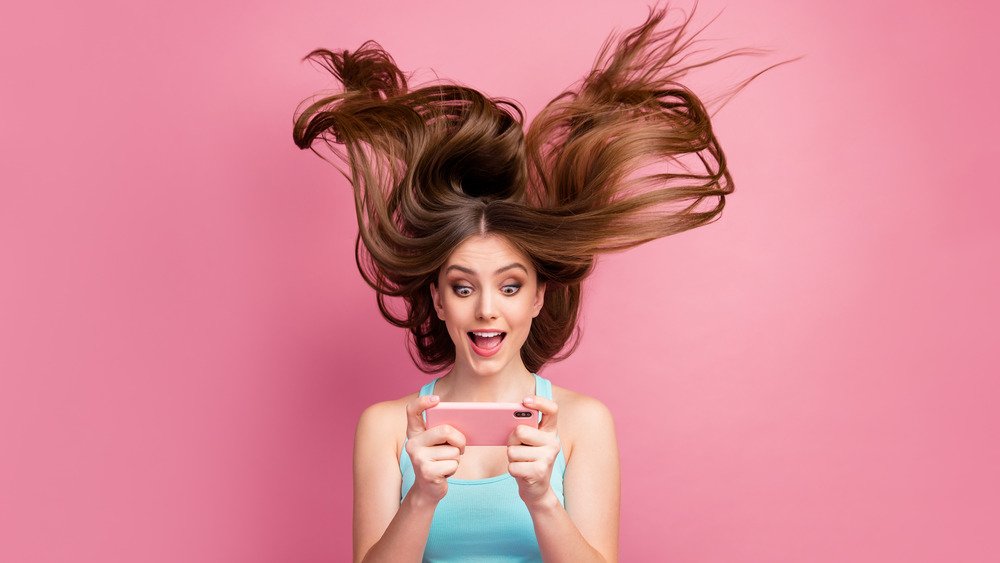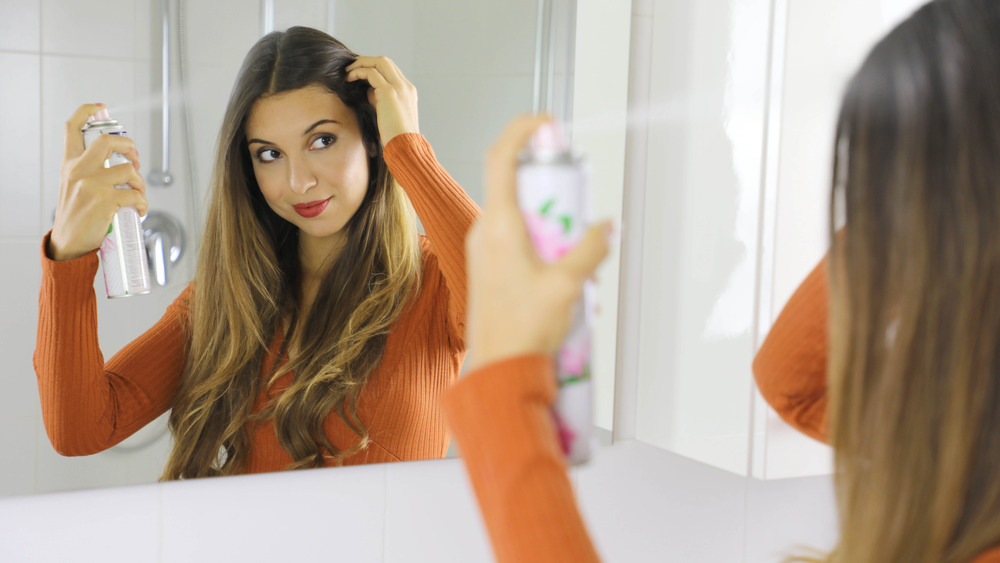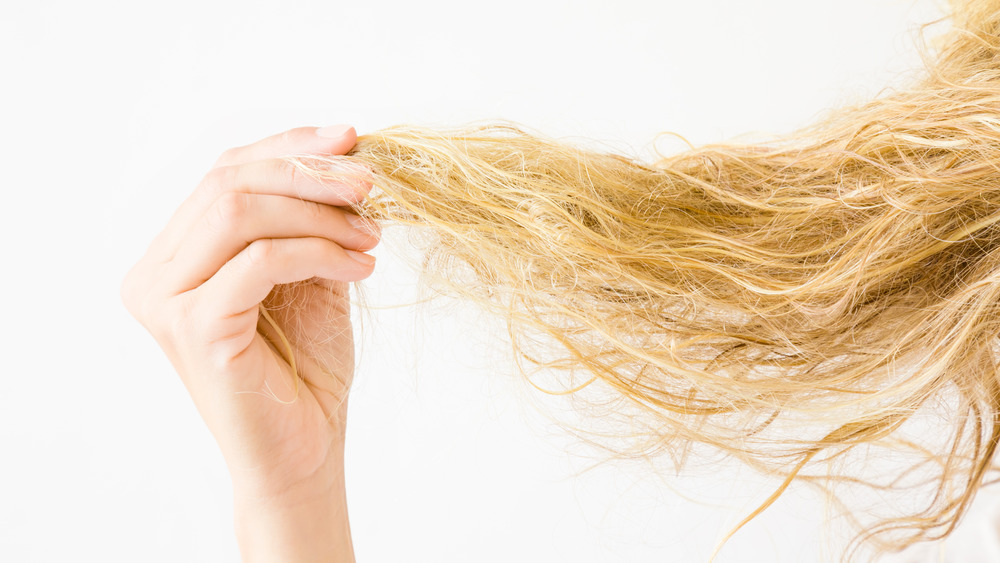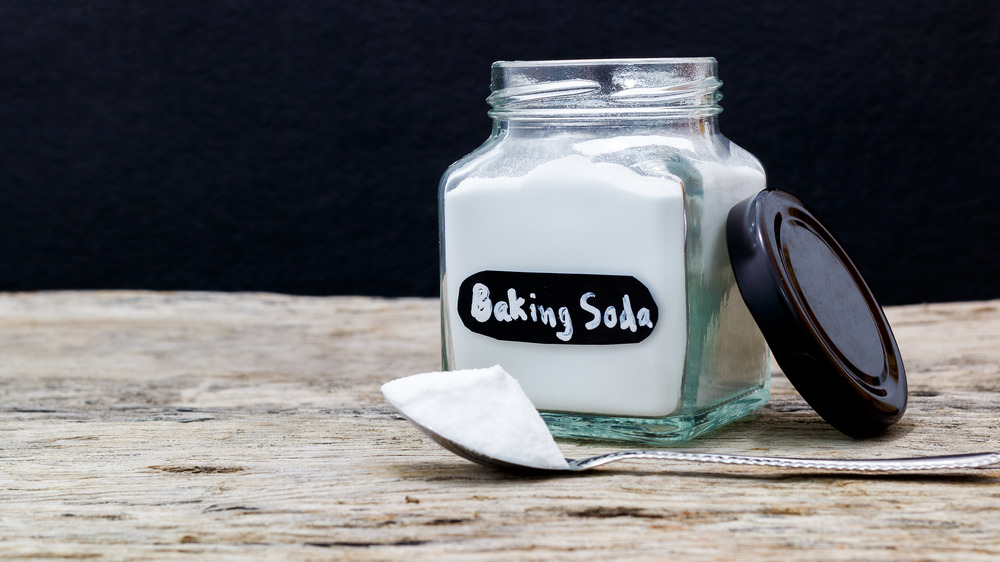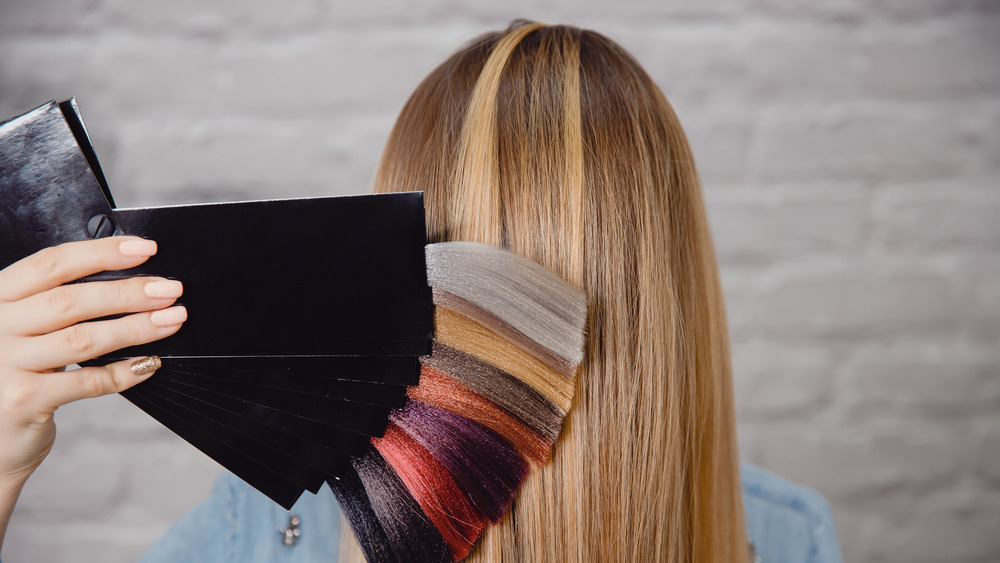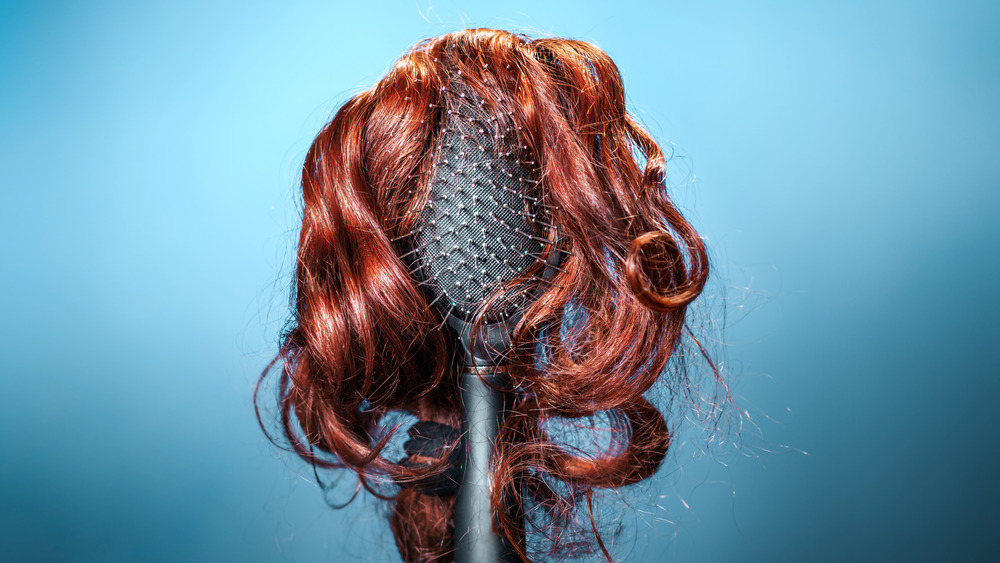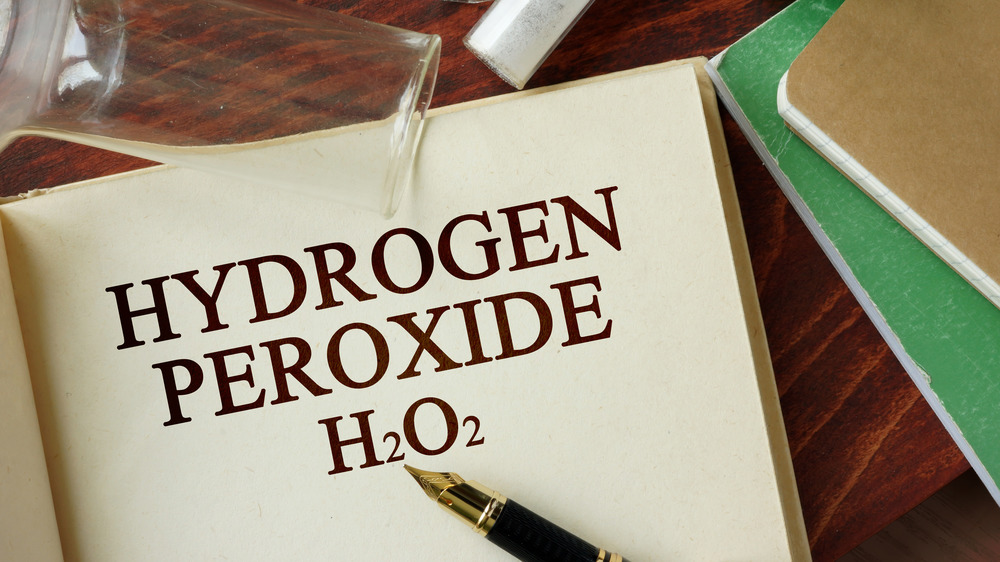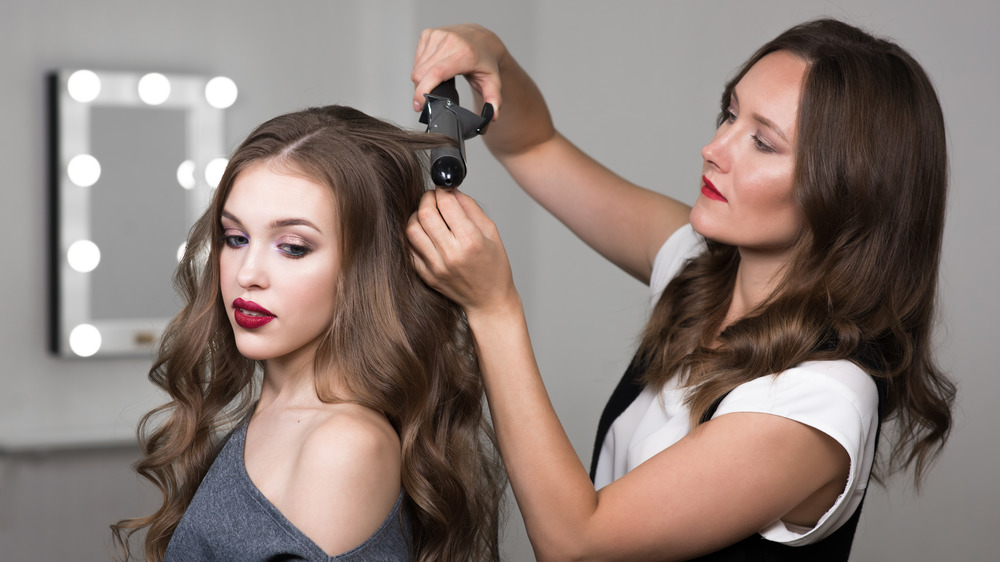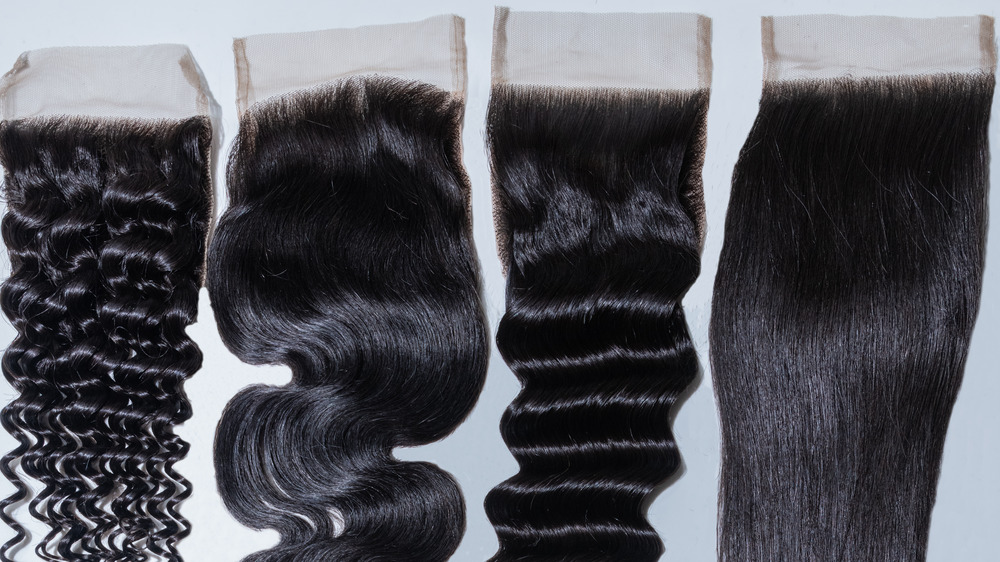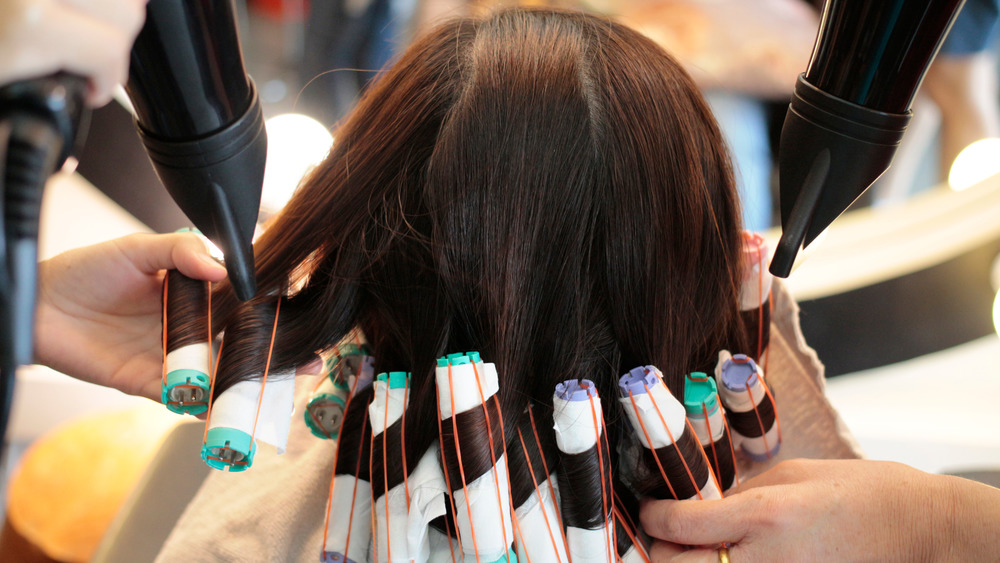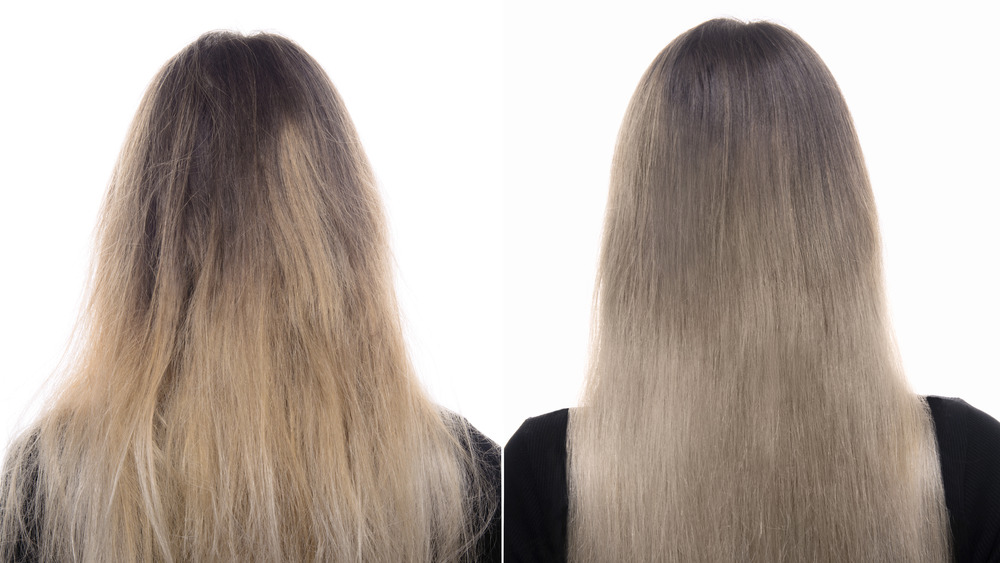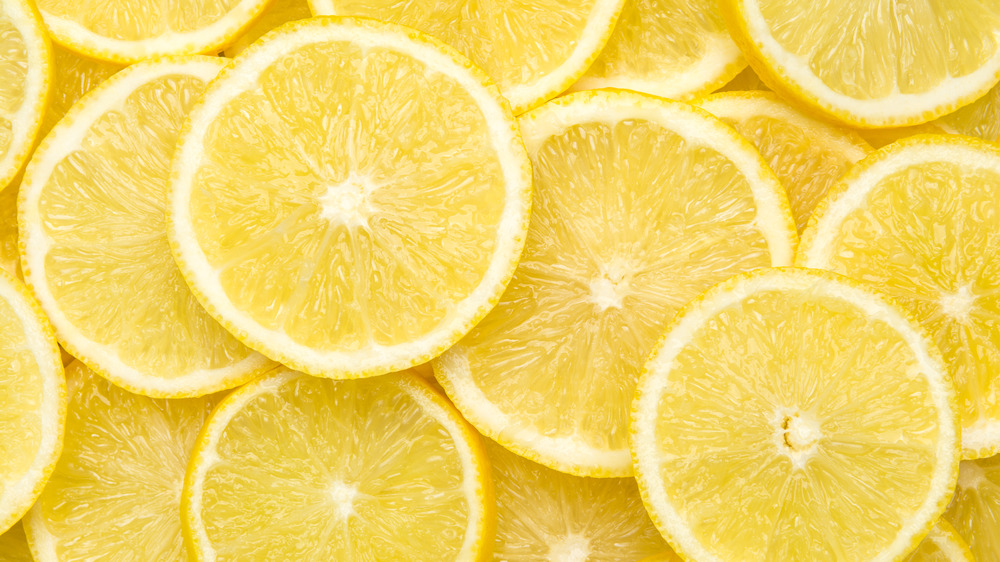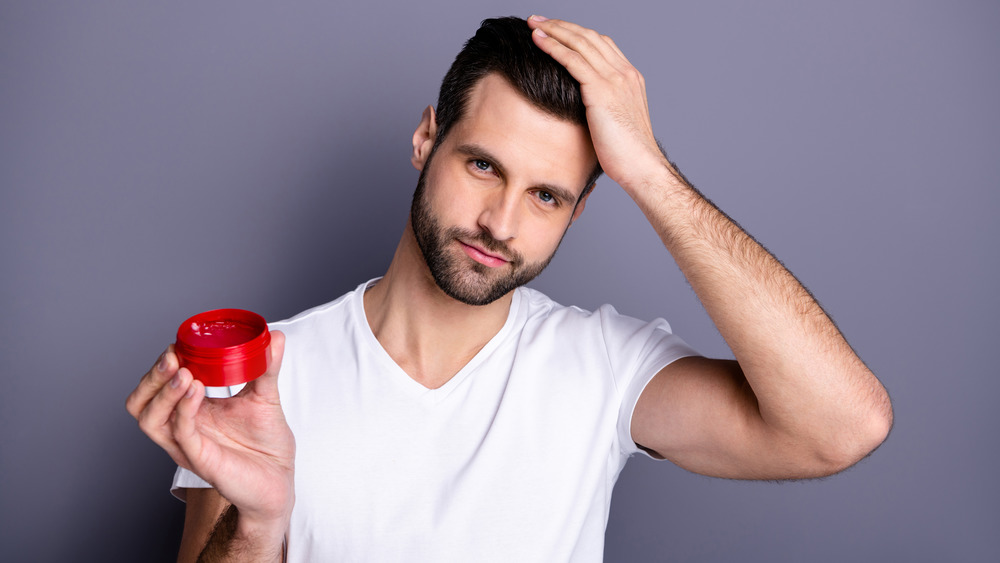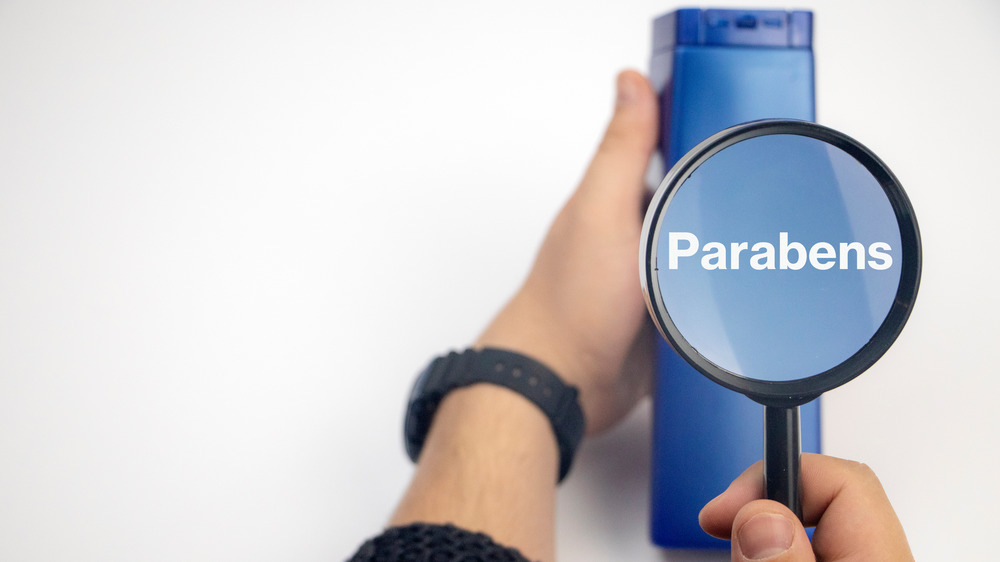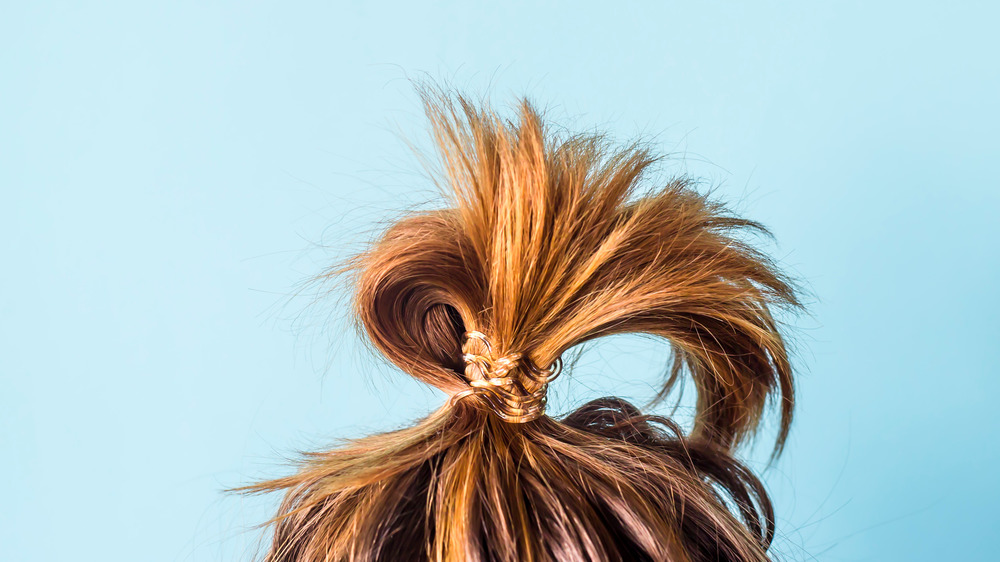Things You Absolutely Should Never Use In Your Hair
When it comes to your hair, there are some things you should absolutely never use. TikTok user Tessica Brown has a message for her viewers, in particular: don't use Gorilla Glue on your hair (via Health). In a case of a "quick fix" causing major problems, Brown applied Gorilla Glue Spray Adhesive to her hairdo to give it a long-lasting hold. Unfortunately, that hold lasted for more than a month despite her washing her hair 15 times.
Can Gorilla Glue be safely removed from hair? Yes, the adhesive's manufacturer recommended Brown use rubbing alcohol on her hair, and Health lists several other possible fixes like nail polish remover that contains acetone, as well as almond, baby, and olive oil. But Brown's cautionary tale is a reminder that even tips and products meant for hair care can have drawbacks or be unhealthy.
However, the bright side is if you feel like your hair is unmanageable, simple changes to your routine, including making your own personal "absolutely never use" list, may be real quick-fix solutions. And keep in mind "hair don'ts" lists vary from person to person based on factors like hair type and general health.
Dry shampoo can cause breakage
Brace yourself: dry shampoo doesn't clean your hair. But wait, isn't the whole point of shampoo to wash sweat, dirt, and excess oil out of your hair? If you're talking about the kind of shampoo you use in the shower, then yes. Dry shampoo, however, absorbs oils, making your hair only appear cleaner (via Healthline). Plus, it contains alcohol, which can dry out your hair.
So, dry shampoo is not a replacement for washing your hair. In fact, overuse of the product can weaken your hair to the point that regular brushing and styling could cause breakage (via Healthline). And if it builds up on your scalp, your hair's follicles can become clogged, leading to itching and even a type of infection called folliculitis.
Now, just to be clear, it wouldn't be fair to put dry shampoo in the same "never ever use" category as Gorilla Glue. But the better option for your hair is to maintain a proper washing routine, including a conditioner (via Healthline). And if you do need to freshen your do up between washes, there are DIY versions of dry shampoo made from rice starch and cornstarch that don't include alcohol.
Frizzy hair? Check your shampoo for sulfates
Does your shampoo lather? If the answer is "yes," then it's very likely it contains sulfates, which are also used in household cleaners and detergents (via Healthline). Now, the good news is, contrary to previous beliefs, sulfates have been found not to cause cancer. But that's where the good news ends.
If you have fine or dry hair, "lathering, rinsing, repeating" with a sulfate shampoo could remove too much of your hair's natural oils (via Healthline). Do you color your hair? There's evidence to suggest that sulfates strip out color treatments. If you're prone to frizz, the negative electrical charge created by sulfates can give you a nasty case of "the frizzies."
People with sensitive skin may also want to steer clear of sulfates in their shampoo (via Healthline). The American Academy of Dermatology (AAD) recommends avoiding sulfates if you have rosacea, contact dermatitis, or eczema. Plus, it is possible to have an allergic reaction, which can cause inflammation, hives, itchiness, rashes, and redness on your face and scalp. Fortunately, there are sulfate-free shampoos available on the market.
Using baking soda on your hair can cause split ends
Look around the internet, and you'll find people touting baking soda as a must for their beauty habits, such as using it to whiten teeth. In fact, some even include it in their hair care routines. But as Medical News Today explains, this isn't backed by science. In fact, the level of pH in baking soda may damage hair fibers, as well as cause frizz and harm the scalp.
Chemistry aside, think about how baking soda feels between your fingers. That gritty texture is because it is made of crystals, which can be abrasive for hair (via Medical News Today). The results? Baking soda can cause breakage and split ends. It also opens up the cuticles of your hair, which can lead to too much water absorption and more fragile individual hair strands. And while baking soda is known for cleaning, removing too much of hair's natural oil can leave your 'do looking dull and your scalp irritated.
If you're dealing with any of these hair issues (whether or not baking soda is to blame) Medical News Today has some recommendations. Products that include coconut, jojoba, and argan oil can help restore hair's moisture. And aloe vera can give you relief if you have an irritated scalp.
Your hair dye may be irritating your skin
Trying out different hair colors can be a boost, but not all hair dyes are the same. Next time you go to the salon or buy your go-to color's brand, check out the ingredients. If you see PPD or paraphenylenediamine, you might want to opt for a different dye.
As WebMD explains, PPD appears to be a common thread when it comes to skin reactions from hair dye. Mild symptoms can include irritation, cracked skin, stinging, and blisters all of which can happen within 48 hours of exposure to a dye. While technically anyone can have a reaction to a hair dye, there are two groups of people that need to be particularly careful: those who are allergic to PPD and anyone with psoriasis. Fortunately, you do have options.
If you think you might be allergic to PPD, then it is critical to pick a hair dye that doesn't use it. How critical? You could experience anaphylaxis, an allergic reaction so severe that it's considered a medical emergency (via WebMD). As for those with psoriasis, avoid dying your hair in general when you're having a flare-up.
An old hairbrush can damage your hair
Okay, it's time to get personal. When was the last time you cleaned your hairbrush? And in this case, cleaning doesn't mean just pulling hair strands out of the bristles. Don't feel bad if you said you don't truly clean it, but you may be doing more harm than good to your do.
Dr. Tsippora Shainhouse, a board-certified dermatologist told Women's Health, "Dirty brushes can make clean hair look dirty, greasy, and weighed down." If you use hair products like hairspray, those products build up over time on your brush and get redistributed into your hair, causing damage. Plus, bacteria, dust mites, and yeast could start finding a new home in its bristles. And the older the brush, the more the buildup, and the more likely you're damaging your hair.
That all sounds pretty bad (and gross), and you may be throwing your hands up, saying, "Then it's impossible to keep a hairbrush clean." Not to worry, Women's Health has some tips for weekly hairbrush maintenance like using a child's toothbrush to scrub between those bristles. But if you've had your brush for a while, it might be time to invest in a new one.
Hydrogen peroxide stresses your hair
If you spill bleach on your clothes, the bleach might eat holes in the fabric. So, is bleaching your hair a good idea? Okay, to start, a number of blonde hair dyes use a chemical called hydrogen peroxide (via Healthline), and while it's considered in general safe to use, that doesn't mean it can't cause damage.
Besides possibly irritating your scalp and hairline, hydrogen peroxide can damage the hair's cuticle, which can cause frizz and breakage (via Healthline). Just under the cuticle is where most of your hair's pigment is located: the hair's cortex. When hydrogen peroxide penetrates your cuticle, it changes your hair color in its cortex, but in the process, it also stresses your hair, which can lead to hair loss.
If you don't want to give up your blonde tresses, Healthline has several non-hydrogen peroxide hair coloring options like honey, chamomile, cinnamon, and apple cider vinegar. Keep in mind, however, that these natural hair lighteners do not work as quickly or as dramatically as hydrogen peroxide.
Curling tongs are not your hair's best friend
If you search online for videos of beauty treatment mishaps, you will find a number of hair catastrophes. A common set up is someone puts curling tongs at a high heat for too long in their hair. The results are the instantly shocking sight of the person burning a piece of their hair off their head. Now, this an extreme example, but curling tongs and other heat devices can be harmful (via Medical News Today).
According to Medical News Today, using heat often on hair can make your locks brittle because it zaps your hair of moisture. And while you might not burn the hair off your head, heated treatments can still damage your individual hair shafts. Compound this with things that are out of your control like humidity, and you have a recipe for unhealthy hair.
Besides curling tongs, Medical News Today explains that other heat products like hair straighteners and blow dryers can also take their toll on your 'do. So, if you want your hair to be less fragile and look healthier, you might want to start with reducing your heat treatments.
Hair extensions can cause hair loss
Like hair dyes, hair extensions and weaves can be a fun way to experiment with your 'do. And unlike dyes, if you don't like a look, you don't have to redye your hair or wait for it to grow out. It sounds less risky all around, except for one important detail.
As Dr. Shani Francis explains to the American Academy of Dermatology (AAD), a person's hair is usually pulled tightly in order for extensions and weaves to work. "The constant pulling can cause strands of hair to break or fall out, and it could damage your hair follicles," Francis notes. And once a hair follicle is damaged, it doesn't grow back, and that can mean permanent hair loss.
But don't panic, Francis did also give AAD some advice to help avoid this issue. For one, don't be afraid to communicate with your hairstylist. If something feels too tight, let them know. Also, Francis recommends taking care of your natural hair with moisturizers to keep it strong. AAD lists additional tips, however, the less pressure you put on your hair, the better, so if you can, go without extensions or weaves (especially the heavier ones).
Perm solutions can make hair brittle
Perms can be a delight or a disaster. If it gives you the look you want, you're elated. If you look in the mirror and the first words that come to mind are "what have I done," well, despite its name, it's not permanent (but it may feel like it is). All kidding aside, the truth is, perms can be bad for your hair.
As the American Academy of Dermatology (AAD) explains, perming treatments can make your hair dry and brittle, and the more often you perm your hair, the more damage you could be doing to yourself. And perming is not alone on this list. Even though it's called relaxing your hair, those relaxer treatments can also take their toll (via AAD).
So, is keeping your hair natural your only option? Well, like with extensions and weaves, putting less stress on your hair is the best choice, but AAD does have some tips. Space out your touch-up appointments, especially if you're having more than one type of treatment done. If you're going to be in the sun, use a leave-in conditioner that has zinc oxide and/or wear a hat. And always condition your hair after you shampoo.
There is a link between keratin hair-straightening treatments and cancer
While a perm might add more curls or waves to your do, keratin hair-straightening products will take those unruly ringlets and turn them into less frizzy, straight hair (via Healthline). The results can make your hair look nice and healthy, but there are real concerns connected to this beauty treatment.
According to Healthline, while keratin is a natural protein, keratin products usually have formaldehyde. Yes, you read that correctly. The same chemical used in embalming fluid can also be found in hair-straightening products, as well as shampoos, hair glues, and hair dyes. And if that's thought isn't unpleasant enough for you, formaldehyde can cause cancer or worsen existing cancer (via American Cancer Society).
While there isn't data at this time on the long-term impact keratin products might have on your health, side effects from exposure to formaldehyde can include scalp irritation, hair breakage, headaches, nausea, mood changes, skin rashes, chest tightness, and hair loss (via Healthline). And remember, manufacturers sometimes list formaldehyde under other names like methanal, aldehyde, formalin, methylene oxide, and morbicid acid, so check product labels carefully.
Lemon juice can dry out your hair
A popular lifehack for lightening hair is using good old-fashioned lemon juice on your locks and then sitting out in the sun. Does it work? Well, hair color is a factor, but yes, lemon juice is a natural bleaching agent and can lighten hair (via Medical News Today). However, there are some drawbacks.
While lemon juice can change your hair's color, it also can make hair drier and more brittle (via Medical News Today). And remember, you not only need lemon juice but also sunlight to get that hair-lightening effect, and unfortunately, the sun's rays intensify how much the lemon juice dries out your do. Speaking of the sun, combined exposure to lemons and sunlight can cause a skin inflammation called phytophotodermatitis where you may experience skin rashes and itchy blisters.
A couple more things to keep in mind: while lemon juice can lighten hair, the jury is still out if it helps with dandruff or makes hair shinier (via Medical News Today). As for lemon juice helping with hair loss, there isn't scientific evidence at this time to back up that claim. Simply put: stick to drinking lemon water, as it actually has health benefits when consumed daily.
Hair gels can cause scalp acne
Most people usually think of acne happening on the face, but those pesky pimples can pop up on your scalp as well. When pores and hair follicles get clogged with dead skin cells, bacteria, mites, or yeast, they form those nasty little zits (via Medical News Today). And while it's common to focus on what you can easily see in the mirror, these breakouts can also show up on the back of your head.
While various factors (like not hitting the showers soon enough after a workout or sweating while your head is covered) can cause scalp acne, Medical News Today notes that products you leave in your hair like hair gels and hairsprays can clog up your pores and hair follicles. In particular, when these products build up on your head, they create the perfect conditions for itchy, sore pimples to form.
If you have scalp acne, steering clear of hair gel and other leave-in products may help. You also may want to switch off to hypoallergenic hair products (via Medical News Today). And remember, letting your scalp breathe is very important, so opt for loose-fitting headgear.
Skin allergies acting up? You might be washing your hair with parabens
Pick up a bottle of shampoo and read the label. You'll likely see a pretty long list of ingredients, some with complicated-sounding names. Unfortunately, the more the ingredients, the better the chance a product might cause an allergic reaction or at the very least irritate your skin.
According to WebMD, if there's water in your hair care product, then it probably has preservatives, which are major culprits when it comes to allergic skin reactions. One of these preservatives are chemicals called parabens, which on top of causing skin issues in some people have also been linked to possibly increasing the odds of developing breast cancer (via American Cancer Society). Other preservatives connected to skin allergies include Quaternium-15, methylchloroisothiazolinone, and imidazolidinyl urea.
Besides preservatives, WebMD notes that fragrances can also irritate the skin and cause allergic reactions. To avoid possibly damaging your skin, avoid brands that use preservatives like parabens. Instead, try to use hair care products that don't have a long list of ingredients and specify they are "without perfume" or "fragrance-free."
Elastic hair ties can hurt your hair's cuticle
Has this ever happened to you? You're running late. Your hair is not cooperating. It's one of those "it has a mind of its own" mornings. So, you grab an elastic hair tie, yank it back into a ponytail, and run out the door. While it's very understandable going for this quick fix, you probably did some damage to your 'do.
As Healthline explains, those timesaving elastic hair bands pull on your hair's cuticle. Once you damage a hair's cuticle, it can cause breakage and frizz. Add to that elastic hair bands can also pull on your scalp, and suddenly it's not a big surprise when you pull out hair as you undo that convenient ponytail.
So, the next time you're dashing out the door here's a couple of simple tips from Healthline: first, the more your elastic hair tie looks like a rubber band, the more likely it is to do harm to your hair. A tie with material such as cotton covering the elastic is your better option. Second, when you do tie your hair back, go for loose, not tight.

